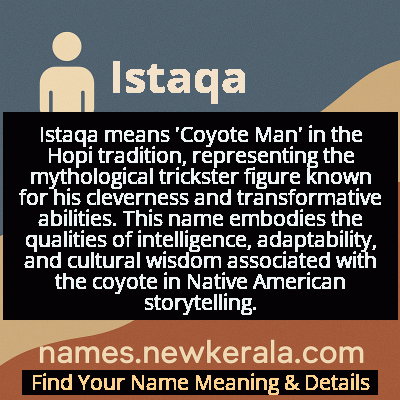Istaqa Name Meaning & Details
Origin, Popularity, Numerology Analysis & Name Meaning of Istaqa
Discover the origin, meaning, and cultural significance of the name ISTAQA. Delve into its historical roots and explore the lasting impact it has had on communities and traditions.
Name
Istaqa
Gender
Male
Origin
American
Lucky Number
4
Meaning of the Name - Istaqa
Istaqa means 'Coyote Man' in the Hopi tradition, representing the mythological trickster figure known for his cleverness and transformative abilities. This name embodies the qualities of intelligence, adaptability, and cultural wisdom associated with the coyote in Native American storytelling.
Istaqa - Complete Numerology Analysis
Your Numerology Number
Based on Pythagorean Numerology System
Ruling Planet
Uranus (Rahu)
Positive Nature
Strong sense of order, loyal, practical, and disciplined.
Negative Traits
Stubborn, overly serious, rigid, and prone to feeling restricted.
Lucky Colours
Blue, gray.
Lucky Days
Saturday.
Lucky Stones
Blue sapphire.
Harmony Numbers
1, 7, 8.
Best Suited Professions
Managers, engineers, accountants, organizers.
What People Like About You
Dependability, discipline, practicality.
Famous People Named Istaqa
Istaqa Komalestewa
Hopi Elder and Storyteller
Preserved and taught traditional Hopi coyote stories to younger generations
Istaqa Lomayaktewa
Cultural Anthropologist
Documented Hopi oral traditions and published works on Native American mythology
Istaqa Nuvangyaoma
Artist and Sculptor
Created bronze sculptures depicting Hopi mythological figures including coyote spirits
Istaqa Quamahongnewa
Environmental Activist
Led conservation efforts to protect coyote habitats in the Southwest
Name Variations & International Equivalents
Click on blue names to explore their detailed meanings. Gray names with will be available soon.
Cultural & Historical Significance
As a shape-shifter and boundary-crosser, Istaqa mediates between the human and spirit worlds, often bringing sacred knowledge to the people while simultaneously demonstrating the consequences of improper behavior. These stories continue to serve as educational tools for Hopi youth, teaching them about their cultural heritage, environmental stewardship, and proper social conduct within the community. The preservation of Istaqa stories represents an ongoing commitment to maintaining Hopi cultural identity and transmitting traditional knowledge across generations in the face of modernization and cultural assimilation pressures.
Extended Personality Analysis
Individuals named Istaqa are often perceived as possessing the clever, adaptable nature of their namesake. They tend to be quick-witted problem-solvers who can think outside conventional boundaries and find creative solutions to challenges. Like the coyote of mythology, they may display a blend of intelligence and mischievousness, often using humor and cleverness to navigate difficult situations. Their adaptable nature allows them to thrive in various environments and circumstances, much like the coyote's ability to survive across diverse landscapes.
However, this same adaptability can sometimes manifest as unpredictability or a tendency to challenge established norms and authority. Istaqa-named individuals often possess strong observational skills and intuition, enabling them to read social situations accurately and respond appropriately. They may exhibit a natural curiosity and desire for exploration, both intellectually and physically, while maintaining a deep connection to their cultural roots and traditions. Their personality often balances traditional wisdom with innovative thinking, making them effective mediators between different perspectives or generations, capable of bridging traditional knowledge with contemporary understanding.
Modern Usage & Popularity
In contemporary times, Istaqa remains primarily used within Hopi and other Native American communities as a meaningful cultural name that honors traditional heritage. The name has seen limited usage outside indigenous communities, though there is growing interest among parents seeking unique names with deep cultural significance and natural symbolism. Its usage reflects a conscious choice to maintain cultural continuity and preserve indigenous linguistic traditions. While not appearing on mainstream baby name charts, Istaqa represents an important aspect of cultural preservation and identity affirmation within Native American communities, particularly among those actively working to revitalize indigenous languages and traditions.
Symbolic & Spiritual Meanings
Istaqa symbolizes the complex interplay between wisdom and trickery, representing the coyote's dual nature as both creator and troublemaker in Hopi mythology. The name embodies adaptability, intelligence, and survival skills, reflecting the coyote's ability to thrive in challenging environments. Symbolically, it represents boundary-crossing and transformation, as the coyote figure often moves between different realms and assumes various forms. Istaqa also signifies the importance of balance – teaching that even negative experiences and mistakes can lead to wisdom and growth, while carrying connotations of cultural resilience and the enduring connection between human society and the natural world.

